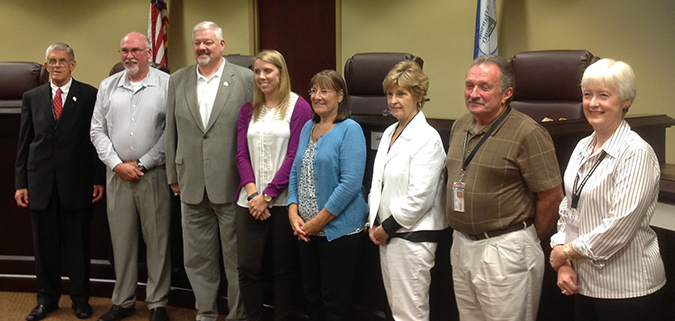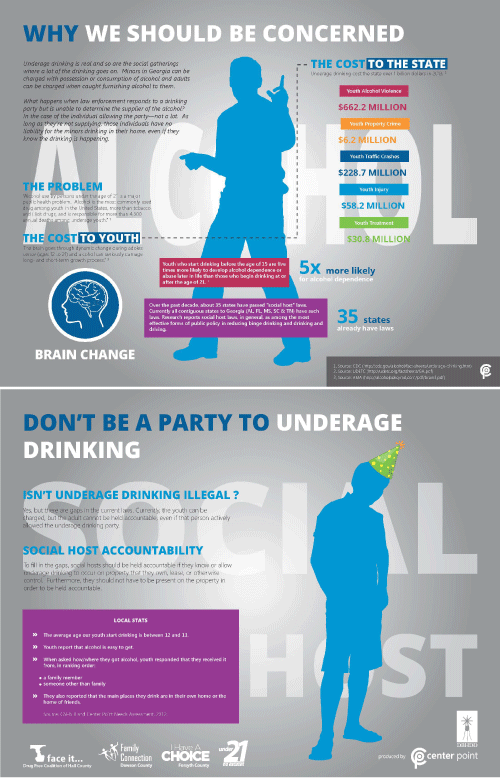Dawson County’s New Ordinance Warns Parents: Don’t Be a Party to Underage Drinking
Print This Post|
|
| Elected officials pose with members of the Dawson County Family Connection after commissioners approve a social host ordinance. From left: Commissioner James Swafford, Sheriff Billy Carlisle, Board Chair Mike Berg, “Be the Key” Coordinator Tiffany Davis, Dawson County Family Connection Coordinator Nancy Stites, Commissioner Julie Nix, Commissioner Jimmy Hamby, and Commissioner Sharon Fausett. |
|
by Elizabeth Turner There hasn’t been a single minor killed in a car crash involving an underage drunk driver in Dawson County in more than six years. What, then, prompted Dawson County Family Connection to lead an effort to adopt a countywide ordinance that holds parents accountable if they allow their kids’ friends to drink on their property? “We are fortunate to not have had any deaths of minors in a DUI incident in recent years,” said Nancy Stites, coordinator for the Family Connection Collaborative. “But we learned through youth focus groups that teenagers were hosting drinking parties every weekend. What concerned us even more was that some parents were not only aware that their own teens were hosting these parties, but that they intentionally provided their homes for groups of kids to drink.” Dawson County Sheriff Billy Carlisle also knew that adults in the community were providing locations for youth drinking parties, but there was little law enforcement could do to hold parents accountable. That’s because in order to charge an adult for enabling a minor to drink illegally under state law, an officer has to prove that the adult purchased or provided the alcohol directly for the minor. “That’s a difficult standard to meet,” said Carlisle. “And it creates a loop hole for adults who claim they had no knowledge that illegal drinking was taking place.” So the community came together under Dawson County Family Connection’s leadership to resolve a problem that threatened the overall health and well-being of their youth. Now adults who know—or reasonably should know—that minors are drinking on their property can be held accountable for the illegal activity, even if they didn’t purchase or directly provide the alcohol. Under a new countywide social hosting ordinance that the Dawson County Commission adopted on July 2, first offenders will be fined up to $1,000 and required to perform at least 24 hours of community service. Dawson is one of the first counties in Georgia to adopt this kind of ordinance. Cobb County—as well as a few cities—have adopted similar laws. The work to pass the social hosting ordinance began more than five years ago when the Collaborative assessed the community. According to Stites, the Collaborative heard from multiple agencies that address issues like domestic violence, child abuse, and theft, that most offenders had a substance abuse problem. “At the time, our local domestic violence shelter estimated that 85 percent of their cases involved alcohol or other drugs, and the Court Appointed Special Advocates (CASA) reported that 70 percent of their cases involve parents who abuse some type of substance abuse,” said Stites. “We know that drinking in youth, and intense drinking are both risk factors for later alcohol dependence, so it makes sense to address underage drinking for the health of our youth, and for the broader benefit to our community.”
After pulling together a coalition to address the underage drinking issue, the Collaborative received an investment from the Department of Behavioral Health Developmental Disabilities—Office of Prevention Services to reduce underage drinking. “We took every effort to determine the community’s knowledge of this issue—their perceptions, and their levels of support and opposition—before we introduced the draft to the commission chair,” said Stites. “The ordinance is a central component of a multi-pronged strategy to help curb underage drinking in our community.” Some citizens expressed concerns that youth DUI offences would escalate under the new ordinance, since house parties will become a less desirable option for youth and their adult hosts, but Stites disagrees. “We looked at similar ordinances in Georgia—and across the nation—to learn from other communities. The data do not indicate that these ordinances create more incidents of DUI among minors—in fact, data show that youth DUIs have decreased in some of the places where these ordinances are enacted. While the ordinance will not eliminate underage drinking, it will decrease the amount of alcohol available to minors in our community.” Others were concerned that the ordinance would infringe on private property rights. But, Carlisle addressed those concerns by assuring citizens and the County Commission that the ordinance does not provide law enforcement with any greater authority to enter someone’s home. He also confirmed that the ordinance does not interfere with parents’ rights to provide alcohol to their own children in their own homes.
Tiffany Davis, coordinator for Be The Key, the Collaborative’s underage drinking prevention campaign, was instrumental in pulling community members together and gathering support for the ordinance. “This is about holding adults liable if they make a damaging decision for another parent’s child,” said Davis in her testimony before the Commission voted. “Adults simply should not be allowed to provide a location for other people’s children to consume alcohol.” According to Davis, underage drinking contributes to poor decisions and judgment that can lead to risky sexual behavior, fighting, assault, accidental injuries, property damage, and community disturbance. “Some well-intentioned parents think that by being able to personally monitor children, they’re protecting them and preventing them from driving under the influence,” she said. “But those parents may be unaware of the other risks to the underage drinker—alcohol poisoning, brain damage, and chronic alcohol addiction.” Stites, who agreed with Davis, said, “We are blessed to be in a community where the commission chair expresses interest in hearing about the issues that affect the health of youth in our county, and we are grateful to have an ordinance in place that addresses our county’s specific needs. Throughout this process, we met and saw a lot of people wanting good for our community—whether they were in favor or against the ordinance—and that was awesome.” |
|
The Georgia Student Health Survey revealed that binge drinking in Dawson County was • Between 10th and 12th grade, students’ 30-day past usage jumped from A community survey showed most adults perceived underage drinking a serious problem, rating it a 4 on a 1-5 scale, 5 being most serious. Unfortunately the survey also showed that adults in Dawson County expect most teens Dawson County’s strategies: • Adopt a social hosting ordinance to hold adults accountable. The intent: • Provide an evidence-based alcohol prevention program to the high school • Build a positive social norm media campaign to target parents through Dawson, Hall, and Forsyth counties formed a Tri-County coalition that includes DBHDD-OPS grant providers. This infographic, created by Center Point in Hall County, shows why under-age drinking should matter to all Georgians, and breaks down the billion-dollar cost to our state.
|
|
Elizabeth Turner is research and outreach manager for Georgia Family Connection Partnership. Read the Dawson News story, “Commissioners approve social hosting ordinance: Fines possible for adults that allow teen drinking parties.” Read the Dawson Advertiser story, “Dawson adults may be fined for underage drinking.” Read the Dawson News story, “Parent group supports social hosting ordinance.” Follow us on Twitter @gafcpnews. |



